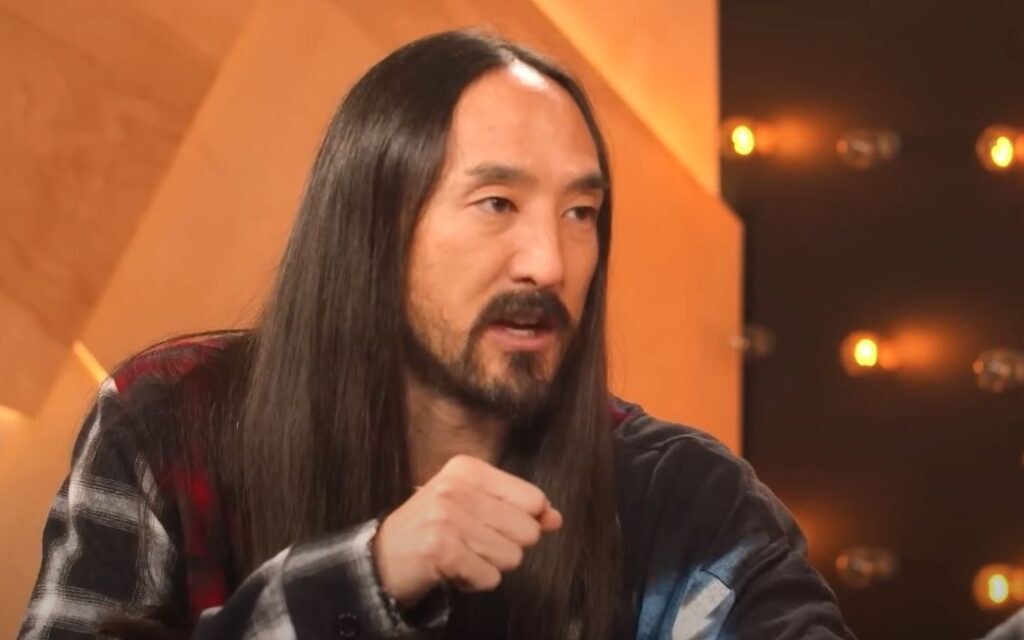
Steve Aoki’s career was built on unrelenting energy, especially creative business instincts, and an unwavering drive to stay relevant over decades of rapidly shifting music trends, which has resulted in his $120 million fortune. He is well-known for doing an incredible 200 to 250 shows annually and has perfected a live touring formula that consistently produces high-end profits. His shows are more than just sets; they are immersive experiences that enthrall and captivate audiences by fusing music, stunts, and audience participation.
When Aoki established Dim Mak Records out of his tiny apartment in 1996 while still a college student, the seeds of his future were sown. This independent label established a reputation for spotting new sounds before they became popular and served as a springboard for both underground and mainstream talent. Aoki established himself as a performer and a gatekeeper in electronic and alternative music by taking advantage of early connections with up-and-coming musicians.
Steve Aoki – Personal and Career Overview
| Detail | Information |
|---|---|
| Full Name | Steven Hiroyuki Aoki |
| Date of Birth | November 30, 1977 |
| Birthplace | Miami, Florida, USA |
| Nationality | American |
| Profession | DJ, Record Producer, Entrepreneur, Philanthropist |
| Active Years | 1996 – Present |
| Net Worth | $120 Million |
| Main Income Sources | Touring, Music Production, Dim Mak Records, Brand Deals, Investments |
| Education | University of California, Santa Barbara – B.A. in Women’s Studies & Sociology |
| Spouse | Sasha Sofine (m. 2024) |
| Notable Collaborations | BTS, Linkin Park, Backstreet Boys, Iggy Azalea, Louis Tomlinson |
His approach to touring has proven to be incredibly successful. Through international tours, club residencies, and festival headlining, he has remained a consistent fixture in the live music scene. Despite their seeming playfulness, the cake-throwing and inflatable raft crowd surfing have been incredibly effective branding strategies — memorable moments that result in viral videos, increased demand for tickets, and long-lasting fan interaction.
Aoki’s wealth is backed by a very diverse portfolio of businesses outside of music. His streetwear sensibilities are reflected in his clothing line, The Dim Mak Collection, which has a global following. His long-term financial stability has greatly increased as a result of investments in businesses like SpaceX and Uber. He is positioned in quickly growing industries thanks to his ownership stake in the esports team Rogue, which demonstrates a forward-thinking approach to entertainment.
Another asset in his wealth strategy has been real estate. His renowned “Aoki’s Playhouse” mansion in Henderson, Nevada, was bought for less than $3 million in cash, which was a surprisingly cheap price given its size. It now functions as a combination of his personal living area and creative center following years of renovations, demonstrating how his personal and professional lives frequently coexist harmoniously.
Aoki’s success has been largely attributed to teamwork. His audience has been varied and his music has remained current thanks to collaborations with BTS, Linkin Park, Backstreet Boys, and pop and punk artists. By reaching out to different fan communities and streaming markets, these collaborations have helped him reach a wider audience than just traditional EDM listeners.
His brand identity is deeply rooted in philanthropy. He funds research into brain preservation, regenerative medicine, and causes like animal welfare and disaster relief through the Aoki Foundation. He raised $65,000 during his 2013 North American tour by donating $1 from every ticket sold to charity, demonstrating that extensive touring can also serve as a potent fundraising tool.
The majority of Aoki’s $30–40 million income during his best years comes from touring. The remainder is derived from investments, brand alliances, and music royalties. His business strategy is characterized by his ability to simultaneously manage several revenue streams, such as merchandise and media appearances. His career is particularly resilient in an industry where revenue streams can change rapidly because of this diversification.
His name is in the same league as Tiësto, David Guetta, and Calvin Harris among the elite DJs. Aoki’s approach is different, though, as he doubles down on live appearances, utilizing them as a means of boosting his worldwide brand in addition to generating income. Year after year, he has maintained his position as one of the highest-paid DJs thanks to his dedication to visibility.
Expectations for electronic music events have changed as a result of Aoki’s performances. He has made EDM accessible to audiences who might not have ever entered a club by fusing the concepts of concert and spectacle. This wider appeal has a knock-on effect, increasing the genre’s commercial potential and opening doors for up-and-coming DJs to break into a more varied market.
